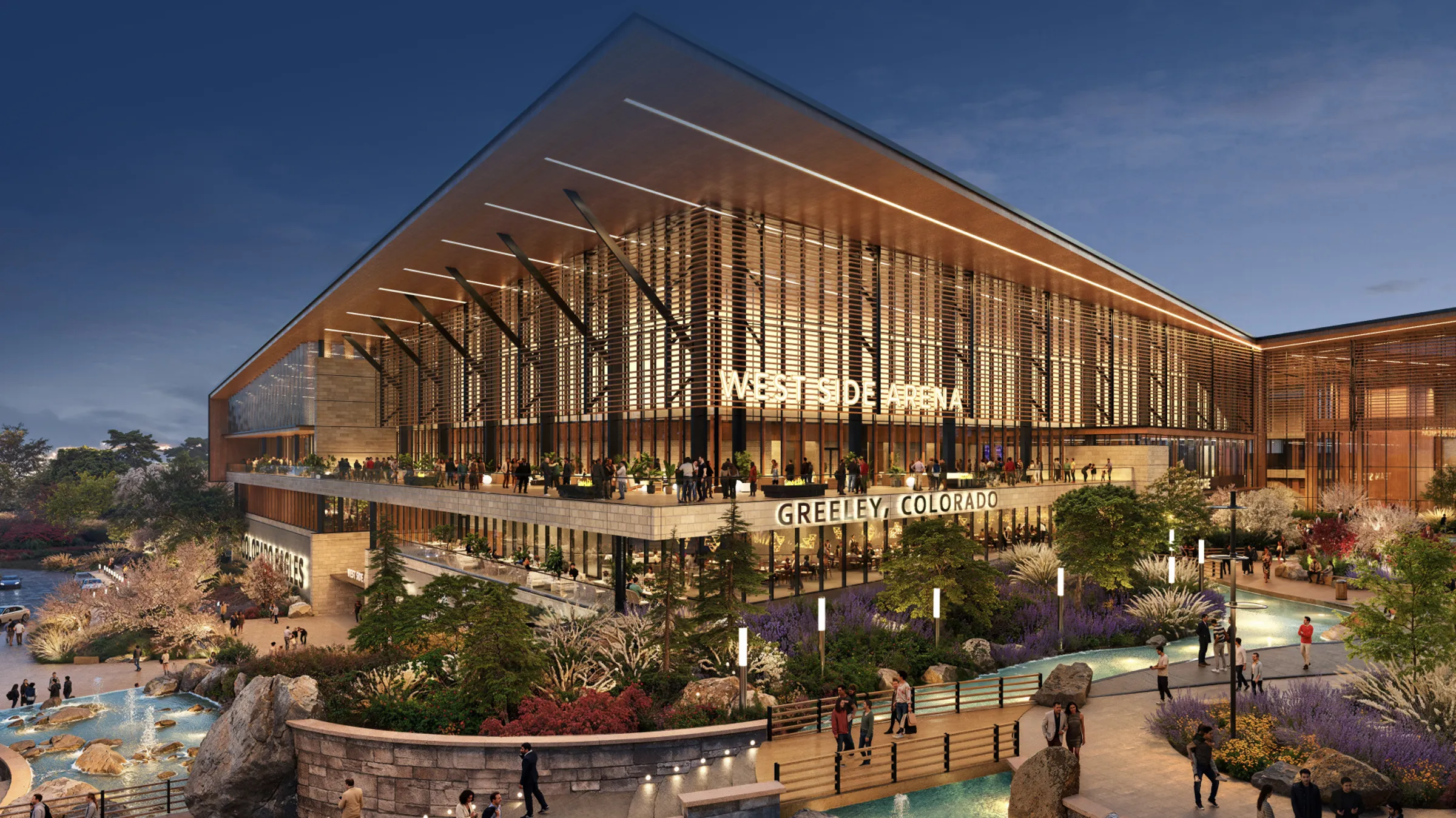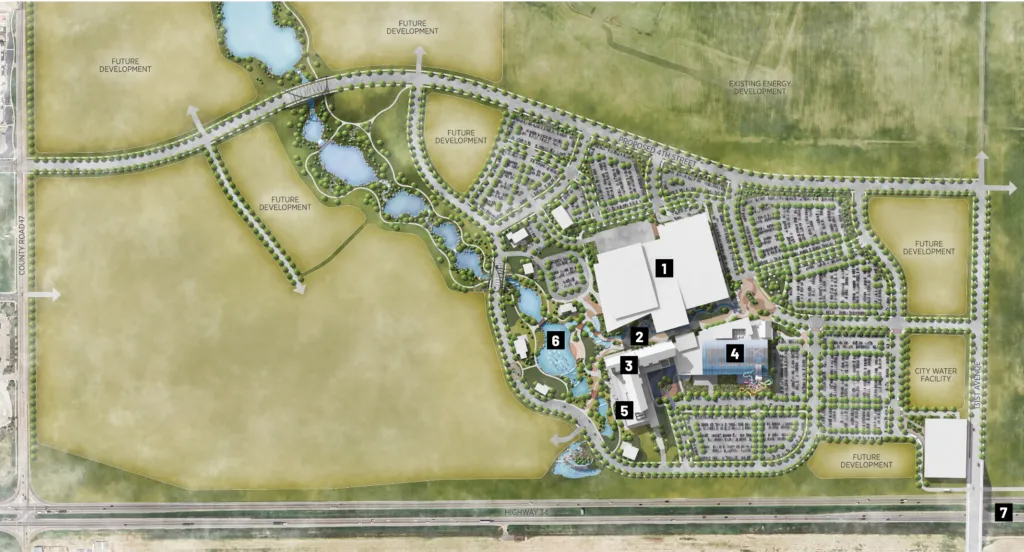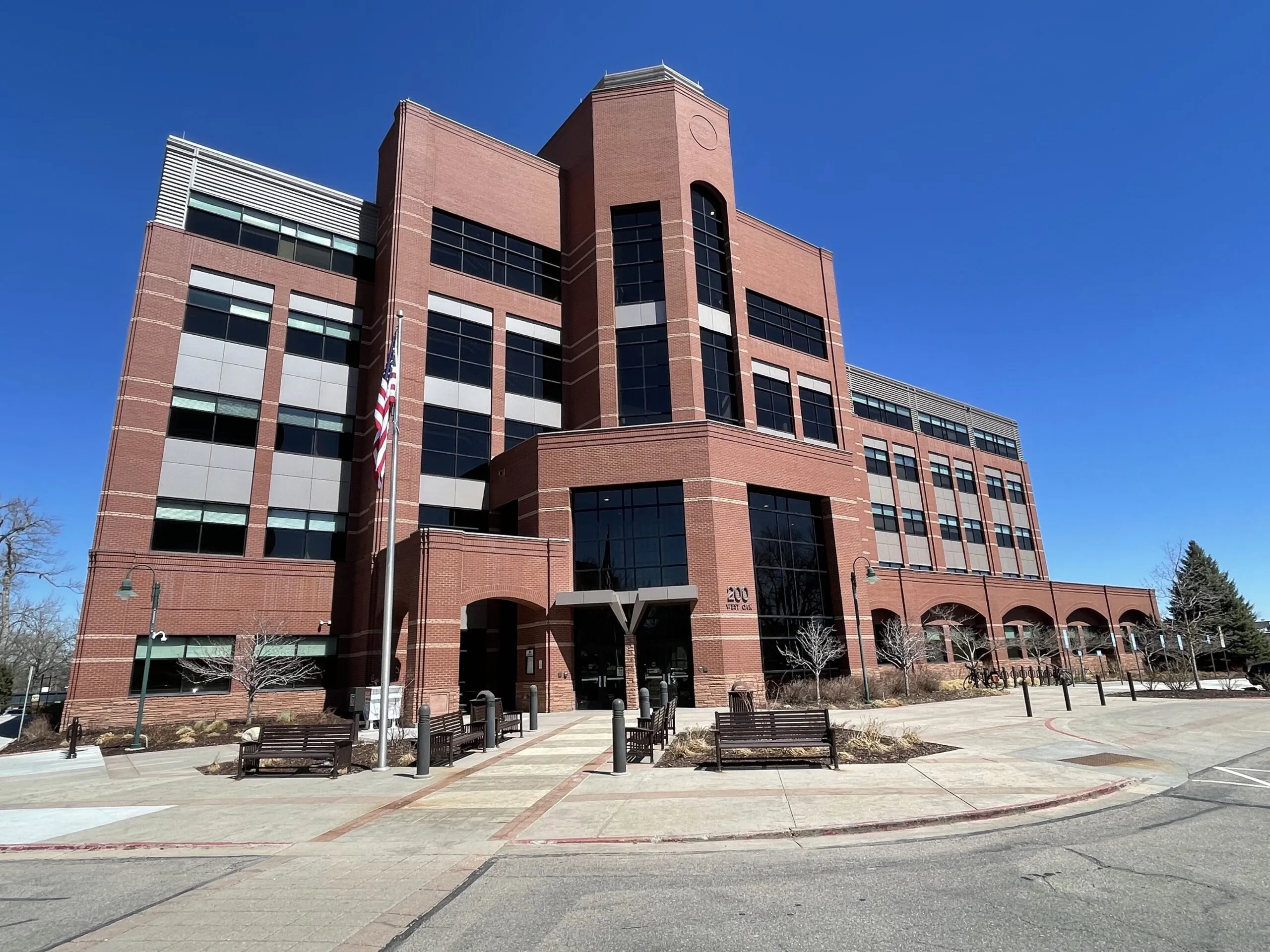Financing faceoff
Can Lind get his grand project past government goaltenders?

Although concerns about public financing led Larimer County to abruptly end its talks with the owner of the Colorado Eagles minor league hockey franchise last spring about a new and bigger home for the team there, the two sides are talking again.
But the sticking point in that earlier proposal also weighs heavily on the City of Greeley’s consideration of the project.
Even as Windsor-based developer Martin Lind continues to buy land on the west edge of Greeley and is pitching an even more complex public financing plan to that city’s officials for “Cascadia,” a $1.1 billion project that includes a hockey arena for the Eagles, three ice sheets for youth hockey programs, plus a hotel, convention center and indoor water park there, he and representatives of his Water Valley Co. sat down Nov. 14 with Larimer County officials for talks both sides depicted as friendly.
SPONSORED CONTENT
“They were cordial, apologetic and nice,” Lind told BizWest. “We had a meeting, and we see their sincerity to re-engage.”
Lind said the officials included Ranch Events Complex director Conor McGrath, county manager Lorenda Volker and assistant county manager Laurie Kadrich.
“It was an energizing conversation,” McGrath said. “We very much enjoy working with him. Martin’s a good guy, a visionary.”
‘The LoDo of NoCo’
Wherever his massive project ends up, Lind said, he predicted it would generate vibrant and lucrative ripples that would rival those of Lower Downtown Denver and draw national and international attention.
“Expect LoDo to grow up around it,” he said. “It’ll be the LoDo of NoCo.”
Both Lind and McGrath, however, agreed that no plans to keep the Eagles at The Ranch would be revived at The Ranch unless negotiations with Greeley fail.
“We will wait to see what happens in Greeley,” Lind said. “I’m not going to play one against the other, and we told the county the same.”
McGrath said the county is “continuing on pace with a slightly different design team” to develop its own new master plan for The Ranch, and “we’d welcome the Eagles back to that table, but we’re also respectful of our municipal partner of Greeley. We’re not in a tit-for-tat conversation. That’s not my style of leadership and not Martin’s.”
John Kefalas, chairman of the Board of Larimer County Commissioners, said that new proposed Ranch master plan will be revealed in a public presentation as part of a Dec. 9 Community Planning, Infrastructure and Resources work session, to begin at 1:30 p.m. in the commissioners’ conference room on the second floor of the county administration building, 200 W. Oak St. in Fort Collins.
“There’s some really exciting stuff coming up,” McGrath said, including an expansion of the Ranch’s courtyard into a Great Lawn, additional vertical infrastructure, a teaching kitchen for commercial and community use, and updated exhibition space at the 38,000-square-foot exhibition hall. That facility, which had been the FNBO Exhibition Hall, was renamed the Pedersen Toyota Center last month after the Fort Collins auto dealership purchased the naming rights.
That transaction was the second the Ranch has signed in as many years. In 2023, it announced a deal with Blue Federal Credit Union to rename its flagship arena, where the Eagles have played since the team’s founding in 2003, from the Budweiser Events Center to Blue Arena.
“We’re looking at some pretty significant bold updates to the master plan,” agreed Kefalas. “We want to continue to emphasize being fiscally sustainable. That’s driving some of the changes currently at the Ranch.”
What happened with Larimer?
Up until six months ago, Lind was certain that his project would dominate that new Ranch master plan.
But the proposal he submitted in December 2023 that was approved by Larimer County officials in February was abruptly rejected in May, and to this day Lind says he isn’t sure why.
“We weren’t part of any of those discussions,” Lind said. “We didn’t know what their thought process was.”
Lind’s Ranch Development Partners had responded to the county’s request for proposals to build a new, larger arena for the Eagles, submitted its proposal in December, and on Feb. 20 was informed that, pending negotiations, it had been selected as developer and operator of a new event arena and youth sports training center at the Ranch as part of a public-private partnership.
However, a document signed May 14 by Heather MacMillan, manager of Larimer County’s purchasing division, and obtained by BizWest, informed Lind that “Larimer County terminates further negotiations with your firm. Larimer County appreciates RDP’s collaboration regarding the negotiations, however, our teams were not successful in negotiating mutually agreeable terms and conditions consistent with the RFP, and the award is hereby rescinded.”
McGrath this week refused to talk about what specific conversations or information received by the county between February and May made the deal with Lind go sour, preferring to focus on the future.
“I and the county, we’re over that and have moved beyond what has occurred,” McGrath said. “We don’t need to have a conversation through the media; we’re much more respectful to Lind than to do that. We respect the relationship that we have.
“We have a good tenant relationship with the Eagles, and we’re looking forward to a number of years left in this agreement,” he said. “We want to be good landlords, and the Eagles are a good tenant. We’re dedicated and committed to the master plan and the project we plan to bring to Larimer County.”
Last summer, McGrath told BizWest that county officials “had not been able to solidify a funding mechanism that really followed the fundamentals for a P3” — meaning a public-private partnership. McGrath said the costs of the upgraded arena would have been “100% borne by the taxpayers.”
All three Larimer County commissioners had echoed McGrath’s concern. Kefalas said “we expect all private partners involved in the project to contribute financially, as it is not viable or fair to expect taxpayers, at this time, to fund a new arena fully.” Commissioner Jody Shadduck-McNally noted that “discussions about building a new arena have raised concerns about ensuring a sustainable funding approach that does not burden taxpayers.” And Commissioner Kristin Stephens contended that “the county has been transparent and proactive in our efforts to support the Eagles and other stakeholders.”
Lind had contested those accounts, however.
To discuss financing, he said, “you’d need to know how much the naming rights to the arena would sell for, and we never got into those negotiations. That’s why it’s impossible for them to conclude any financial model.”
Still, Kefalas repeated Saturday that Lind’s team was “hoping for a lot more to be paid for by the taxpayers. Ultimately that contributed to not continuing the conversation. The expectation was that too much would be on the public side. We needed a fair balance of public and private investment, and to know how that fits into the overall economic development of Northern Colorado.”
Lind responded, “I would challenge them to find one correspondence to that effect to us” between the county’s approval in February and its termination in May.
He acknowledged that there was public financing involved, but that “the equity they’re talking about is a much bigger picture. The equity is the sales tax boom that this project creates.
“In simple terms,” he said, “if Larimer’s going to go build a public park, there’s no equity. It’s a 100% negative to the taxpayers. But it’s an amenity that generates revenue by making the community better.
“That’s what the arena does; it’s an economic engine.”
A Colorado Open Records Act request by BizWest, for which it paid the county $1,000, revealed no specific letters, emails or other documents between February and May that would seem to lead Larimer officials to the conclusion they reached.
The correspondence BizWest obtained does include an April exchange between McGrath and Lind that included a request from McGrath that a block of rooms at the proposed hotel be reserved “in perpetuity” for Ranch events and a Lind complaint that he was feeling a “giant disconnect” with the county and that the land mass the county has wasn’t sufficient to hold his Rocky Mountain Grand Resort and water park.
McGrath responded with his desire to “work together and move forward. I like to get stuff done,” an attitude Lind found “so refreshing to hear.”
Why does what happened last spring still matter to Lind, since he seems to have found a receptive audience for his plan in Greeley?
“Having Larimer turn it down paints the project as bad,” Lind said. “The actual project has to defend itself. I have to defend it.”
It was aggravating, he said, “to have somebody throw it in the trash before it’s vetted.
“At the county’s request, we redesigned the hotel,” he said. “We bought a world-class team of architects, engineers and developers. It was an incredible effort to not only make the submittal but do all the followup process to be awarded the contract.
“For us not even to get an exit meeting or phone call but just to get an email that says you’re terminated without an explanation is one of the most disrespectful processes I’ve ever been involved in,” Lind said. “The Water Valley Co. and the Colorado Eagles are proven entities in Northern Colorado, and our project and our reputations were on trial on this project.”
On to Greeley
Larimer County’s termination of the discussions naturally aroused suspicions among Greeley city officials, and an email from Deputy City Manager Rachel Flynn asked Lind to explain. Water Valley’s chief financial officer, Gary Kerr, responded with a timeline of the project dating back eight years, and wrote of the May 14 termination that “this notification came to us as a complete surprise, without any warning or discussion as to the county’s concerns or issues and after only a minimal effort on the county’s part over the previous two months to engage in meaningful negotiations with our team. In our opinion, its delivery was undertaken in remarkable bad faith by Larimer County.”
Lind said the project would have been easier to do in Larimer County, and thus the financing plan for The Ranch site was different from what he has since presented to Greeleey.
“Larimer had a sales tax that voters approved in 2018, a dedicated revenue stream,” Lind said. “Greeley doesn’t have that.”
His company brought in Dallas-based Matthews Southwest because “we had to have a development team that had done successful projects of this magnitude,” Lind said. “That’s how it should have been. We as the master developer wouldn’t be involved in the details. We’d bring in the mixed-use side of the equation, where the hotel and water park would come in.”
Lind said his team “never saw a third-party study from Larimer County like Greeley’s done.”
Challenging Larimer County officials, Lind said, “You say you can’t afford it? What is it going to cost you to lose the Eagles? We’re the economic engine of The Ranch.”
Lind acknowledged that the existing sales tax couldn’t pay for the project, but said his team did show county officials “the mechanism of what it would take,” and how well the financing would work would be “all about their priorities. They’ve spent $25 million on things at The Ranch, and they’ve done it with cash. So their priorities have not been to build an escrow account for this project. They spent it on other things.
“It’s no different from your personal finances,” he said. “ Do you want a new car or do you want to make a house payment?”
Lind two years ago had proposed the hotel and water park to be located near Northern Colorado Regional Airport in Loveland. “Loveland did a third-party study that found the water park would be a $1.5 billion benefit to the city of Loveland over five years — and that’s just the water park, not the arena or youth hockey.
“What’s it do for the area? What’s the value all that traffic brings?”
Lind said the project as it was presented to The Ranch had to be analyzed and approved as a whole. “The arena and youth hockey have to have the hotel rooms, and the hotel rooms have to have the arena and youth hockey..
“That’s the way Greeley’s analyzing it. They’re doing the process exactly right, leaning on their staff to find fatal flaws,” Lind said. “They’re doing everything right to underwrite the deal.”
Greeley leaders went to an outside firm to evaluate the project’s financial viability and expect results next month.
They need to know whether the project, which Lind would build on 110 acres north of U.S. Highway 34 between Weld County Road 17 and 131st Avenue, a mile west of Colorado Highway 257, would be financially viable. They need to know what role the city would play in terms of incentives or cost-sharing, how such a project would affect downtown Greeley, and whether some of the city’s new $65 million in debt for transportation that voters just approved would help fund traffic improvements there.
Lind’s proposal to Greeley would require the city to guarantee the project’s $1.1 billion debt.
On Wednesday, Lind and third-party financial pros walked Greeley City Council members through a complex potential financing structure for the project. Cascadia would be funded through the revenues it generates once it opens as well as through $793 million in bonding for the hotel, arena and water park, $235 million for infrastructure to be financed through general improvement district bonds, and through $62 million in bonding for water and sewer infrastructure. The main bonding for the project would be through a “conduit borrower,” set up as a 501(c)(3) agency by Baton Rouge, Louisiana-based Provident Resources Group.

Remembering Larimer County officials’ concerns about public financing, Lind said at the work session that “the debt isn’t really in Greeley’s name, but Greeley has to guarantee it, like dad as the cosigner. The bondholders know Provident and they only take on high-quality projects, so the appetite for the bonds is higher. Greeley giving the moral obligation assurance should lower the interest rates. They don’t have to use a nonprofit to be the vehicle, they could do it themselves. This is just a proposal we brought to them.”
He said other successful projects were built with similar funding structures, such as Union Station in Denver, the hotel at Metropolitan State University of Denver and the Polaris Hotel in Colorado Springs. It also is the same structure used to create North Colorado Medical Center in Greeley.
Those successes, he said, led him to be able to promise that Cascadia will be successful as well, and thus he could cede ownership of the arena, hotel and water park and merely be a tenant there. His profit, he said, could come from the 1,000 acres of developable land he owns around the project, where he plans 6,000 housing units and other commercial development.
However, the complexity of the financing plan did lead councilmember Johnny Olson to ask Lind’s team to present it in a simpler form and councilmember Deb DeBoutez, in an email response to questions after the work session, to note that, “I need much more time to digest and learn about the costs and risks. The potential rewards are exciting, but the devil is in the details and that is what I am focusing (on) from now on.”
Greeley officials plan to return to the City Council by Dec. 2 with a final market study and an economic impact study on Dec. 16. If the council approves, construction could begin next summer.
Lind said he needs the Colorado Eagles to be playing on new ice somewhere by June 2028 because his lease at Blue Arena will have run out.
Whether the Eagles move to Greeley or not, McGrath said, “we would continue our plans to bring a new event center and arena to The Ranch. Until we see any advancement of breaking ground in Greeley, we’re staying with our plans for a new arena at The Ranch. We have no contingency plans that we are working on at this point because of the other event space we have. We have concerts, rodeos, auctions and more.”
Meanwhile, he said, “we’re still committed to serving the Eagles and fulfilling our roles, our activations, our promotions, our co-sponsorship deals.
“We have a wonderful relationship with the Eagles’ staff and their leadership team,” McGrath said. “They’re great people to work with, and great people generally.
“If that’s not to be and we worked in good faith with Lind,” he said, “I fully understand his rationale.”
Added Kefalas, “I’ve always said the door is always open with him. I’m glad there might be a partnership with him on some of these efforts. I’m glad there have been some renewed conversations. There may be some opportunities.”
BizWest reporter Sharon Dunn contributed to this report.
Although concerns about public financing led Larimer County to abruptly end its talks with the owner of the Colorado Eagles minor league hockey franchise last spring about a new and bigger home for the team there, the two sides are talking again. But the sticking point in that earlier proposal also weighs heavily on the city of Greeley’s consideration of the project.





